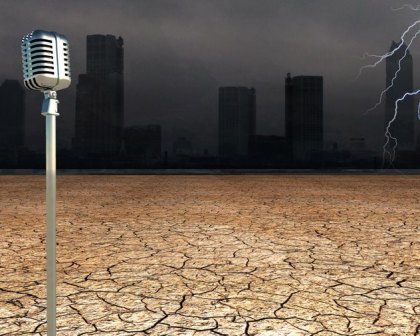Video:
Trump and the first dystopian presidency

Merriam-Webster defines dystopia as an “imaginary place where people lead dehumanized and often fearful lives.” Dystopian, the adjective, is simply "of or relating to dystopia." Both are the opposite of another word, utopia. First used by the humanist Sir Thomas More, utopia describes an ideal society.
As a rule, dystopian describes fictional cultures or societies. But the word also pops up in descriptions of the new president. Dystopian was used in articles about his speeches as a candidate. And Trump's gobsmacking inaugural address was described in Vanity Fair as dystopian. (Who would have thought of dropping tombstones and carnage into a speech theoretically crafted to unify the nation?)
The beginning of a presidency should be a time of optimism, and each new administration must be given a chance to succeed. But dystopian feels like the right word to describe every single day since the inauguration. One troubling news story follows another -- fractured relations between the U.S. and Mexico, disturbing pronouncements about torture and longtime State Department employees put out of their jobs. (Does our president intend to drain the swamp or shoot holes in the ship?) And in a Time magazine op-ed, Mikhail Gorbachev, former head of the Soviet Union, warns that countries appear to be readying for war.
The world is a fearful place indeed. But the credit for driving the American public into one, big dystopian book club goes to Trump adviser Kellyanne Conway.
It started Jan. 22, when Meet the Press moderator Chuck Todd questioned Conway about a White House spokesman's assertions that Trump’s swearing-in ceremony was "the largest audience to ever witness an inauguration, period."
News organizations provided photographs showing a far larger crowd on the National Mall during the inauguration of President Barack Obama in 2009. The press secretary’s falsehood “undermines the credibility of the entire White House press office on day one,” Todd charged.
“Don’t be so overly dramatic about it Chuck,” Conway said, adding that Trump's spokesman was offering “alternative facts.”
Conway's odd contribution to the political lexicon resonated in the worst possible way. The exchange lit up Twitter with users drawing parallels to George Orwell's dystopian novel, 1984. Published in 1949, the novel has again shot to the top of the Amazon best-seller list. As of Thursday, Amazon listed new hardback and paperback copies as temporarily out of stock.
And no wonder. In Orwell's dark story, the beleaguered protagonist, Winston Smith, works for the Ministry of Truth, where history is rewritten. The “directing brains” of the effort, Orwell explains, “laid down the lines of policy which made it necessary that this fragment of the past should be preserved, that one falsified and the other rubbed out of existence.”
Even the phrase, “alternative facts,” brings to mind Newspeak -- the fictional, government-spawned language from the book.
But beyond the lies, reconstructed reality and “alternative facts” put forth by Trump's administration, a chill has taken hold. Every few minutes, or so it seems, the president must have the last word (or the final tweet). Or there is a dust-up that he must win, or a complex situation in which he cannot admit that someone else may, in fact, know more. Each new story is at once compelling and headache inducing. It leaves the reader feeling spent and anxious, much like Orwell's 1984.
Orwell begins his novel with Winston Smith rushing along in the cold, "chin nuzzled into his breast in an effort to escape the vile wind.” When the hero scoots into his apartment building, “a swirl of gritty dust” enters along with him. That chill, along with the swirl of gritty dust, drifts through every troubling page of the novel and has followed Trump's moving vans to the White House.
Trump alone can rest easy. He has secured his place in history. He is our first dystopian president, and the air around him is soiled by a gritty swirl of alternative facts.
Related:
Will manufacturing jobs return to the U.S.?
Follow StudyHall.Rocks on Twitter.
If you would like to comment, give us a shout, or like us on Facebook and tell us what you think.

